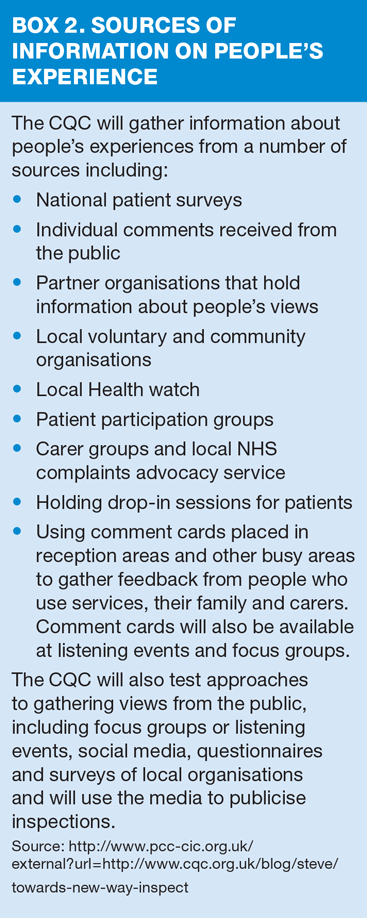
An inspector calls: GP practices face closer scrutiny
The author is a professional adviser who regularly participates in Care Quality Commission inspectio...
The author is a professional adviser who regularly participates in Care Quality Commission inspections in general practice
New and more rigorous CQC inspections get underway this month and practices that are found wanting could be placed in ‘special measures’. We look at what the new style of inspection entails
The Care Quality Commission (CQC) began inspection of GP practices in April 2013. The inspections so far have revolved around a practice’s compliance with the 16 CQC essential outcome standards. However, the CQC has recently announced an important shift in the way GP practices will be monitored and inspected in future and this new wave of inspections will be introduced this month (October 2014). The inspections now will be more rigorous and aim to determine the quality of service through a rating system. The ratings will enable people to compare services and to highlight where care is outstanding, good, requires improvement or is inadequate.
CQC’s proposed framework for inspecting NHS general practices and GP out-of-hours services will ask five key questions:
- Is the service safe?
- Is the service effective?
- Is the service caring?
- Is the service responsive?
- Is the service well led? (Box 1)
POPULATION GROUPS
As well as focusing on the five key questions, the CQC will look at how services are provided to people in specific population groups. For every NHS GP practice they will look at the quality of care for the following six key population groups:
- Older people
- People with long-term conditions
- Mothers, babies, children and young people
- The working-age population and those recently retired
- People in vulnerable circumstances that may have poor access to primary care
- People experiencing a mental health problem.
Ratings will be based on a combination on what is found at inspection, what people tell the CQC (Box 2), Intelligence Monitoring data and local information from the provider and other organisations. The rating will be based on a four-point scale: outstanding, good, requires improvement, or inadequate.
The reason for this change is the publication of the Francis Report, which identified serious deficiencies at the Mid Staffordshire NHS Trust hospital, and the need to identify potential problems before they can develop into major failings.
There are also concerns about the massive variations across NHS GP practices in what should be an equitable service.
Since April this year the CQC, working closely with NHS England, has been testing its approach to ratings for GP practices and GP out-of-hours services.
Practices will now receive two weeks’ notice of an inspection instead of two days, and larger inspection teams including an Inspector, a GP, a practice nurse or practice manager and possibly an ‘Expert by Experience’ – someone who uses, or cares for someone who uses, a GP practice. The CQC will also carry out some unannounced inspections if, for example, they have concerns about a practice or if they are following up on concerns identified in a previous inspection.
The CQC is in the early stages of the development of this approach to general practice Inspections. Sir Steve Field, a GP, has been appointed as chief inspector to lead this development and there has also been a recent appointment of a National Nursing Advisor for primary care.
Inspection teams will base their ratings on all the available evidence, using their professional judgement.
A draft handbook outlines the approach the CQC is proposing to use once the regulations underpinning the Care Bill are in place (subject to Parliamentary approval). Until that point the CQC will apply the principles and guidelines that they have outlined in this handbook to determine shadow ratings.1
The aim is to identify and celebrate good and exceptional practice and also to identify those practices that need to improve and which should not be able to continue to provide inadequate care indefinitely.
SPECIAL MEASURES
Under the new approach, if a practice is deemed to be ‘inadequate,’ it will have six months to improve. If the practice does not improve within the six months, it will be placed into ‘special measures’.
If the practice was still found to be inadequate after a further six months, the CQC may cancel its registration and/or NHS England may terminate its contract. A practice may be placed into special measures immediately if necessary.
The CQC believes that there will be a very small number of providers that lose their registration. Unless there is an immediate safety issue found, the practice will be given the opportunity to improve first. It will be the responsibility of NHS England to ensure an alternative provider is found for the practice population.2
What will special measure involve?
The short answer to this is that we do not know yet but will probably mirror what happens in trusts that are placed under special measures.
1. A service that is underperforming can partner with a highly performing service in order to help the service improve
2. An action plan is written by the service in discussion with the regulator and local commissioners. It contains details of what improvements are needed and the progress that has been made. The service regularly updates it with details of the progress they’ve made.
3. An improvement director is appointed to monitor the service’s progress as it works to achieve the specific steps set out in the action plan.
A service will only come out of ‘special measures’ when the necessary improvements have been made and this is usually expected to be within one year.
However, for practice nurses and other staff working in a practice that is deemed inadequate or unsafe this will be both a worrying and demoralising time. Practice Nursing Association chair Tina Bishop has said: ‘No-one wants to be associated with poor standards and practice and if a practice has their contract cancelled where does this leave practice employed staff?
‘If NHS England provides an alternative provider there might be an opportunity there for the practice staff to be re-employed. However, practice nurses will need to consult with their unions immediately to obtain the support and advice they will need.’
REFERENCES
1. Care Quality Commission. How we inspect GPs and primary medical services when they are registered. http://www.cqc.org.uk/content/how-we-inspect-gps-and-primary-medical-services-when-they%E2%80%99re-registered
2. PRWeb. ‘23% of GP practices found to be non-compliant.’ Press release, available at: http://uk.prweb.com/releases/2013/8/prweb11048542.htm
Related articles
View all Articles

